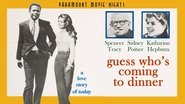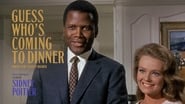Adam Moore
Thinking about the movie's premise now, it's something you would see played for comedy nowadays. A white woman bringing a black man home for dinner with the parents, it's rather laughable. But what holds up about "Guess Who's Coming to Dinner", how it remains serious is how deep it goes into its subject matter. About more than just prejudice and racism, this story dives into concepts like liberalism and romanticism, about letting go of the old for the new, without getting too far ahead of itself.And all that narrative depth is backed up by some great performances. Sidney Poltier is compelling and relatable as Dr. John Prentice. Every time his wife-to-be Joanna pushes their relationship just a little farther, his worry is clear, not about going through with it, but about ensuring everyone's approval. Spencer Tracey and Katherine Hepburn as the parents are fantastic to watch; Hepburn is amazing with her expressions, portraying her emotions with subtlety and allure. Meanwhile, Tracey gives a heartfelt performance, serving as the most conflicted character throughout the story.The movie isn't too serious though; it has enough a sense of humor that it's never boring or melodramatic. There is a point near the end where it gets somewhat heavy-handed with the points and themes, but it feels deserved and it's still enjoyable to watch. Aside from a couple parts that felt unnecessary, and a situation that pushes on the surreal at points, this is an exceptional movie. Its base premise may not be timeless, but its characters and their respective conditions will be.
maureenmcqueen
I went to see it for the first time with my grandmother when I was 17. I loved it but it felt strange to me because my grandmother after 22 years of widowhood, had remarried to an African American man. He had become a blessing in my grandmother's life and in ours. How could Spencer Tracy of all people be against the union? After the movie we went to dinner and my grandmother answered all my questions with a single answer that's been with me always and that sometimes explains absurdities like Charlottesville 2017 - "Society, humanity doesn't evolve all at the same time" Of course Grandma', you were right. Watching Guess Who's Coming To Dinner in 2017 was an experience. Is not that Spencer Tracy is against their union, - Tracy was only worried to what his daughter was going to face 1967 - He was thinking like a father and not like a thinking, evolved liberal. On the other hand, Roy Glenn, Sidney Poitier's father objects to his son marrying a white girl. Sidney Poitier stops him by saying "Dad, you see yourself as a colored man, I see myself as a man" Was it as didactic as it sounds in 1967? Who cares? The message was delivered - I also was so moved to see Katharine Hepburn and Spencer Tracy together for the last time and they knew it was for the last time. Sidney Poitier is superb as the messenger who points at the absurdity of racism. Guess Who's Coming To Dinner is a delicious document of its day.
sharky_55
"They call me Mister Tibbs!" thunders Sidney Poitier in In the Heat of the Night, a classic, monumental line from a film that would later win Best Picture amongst other accolades. The cynicism in some may attribute this recognition as a sort of over-compensation and apology. In this film itself Poitier even references the phenomenon, remarking how he (jokingly) thinks he has advanced his career so quickly at such at young age because no one in his way wanted to seem prejudiced. It is easy to fall victim to this mindset of Poitier's various roles in the 50s and 60s as the black saviour, the Negro that steps into the white man's position flawlessly and rights their wrongs. He is no different here; Kramer has gone to great lengths in giving not an inch of breathing room or hesitation at our judgement of Dr. Prentice. The Yale educated doctor is polite, well-spoken, courteous, sensitive and worldly. He has stepped into the best possible outcome of his modest upbringing and is striving to do even more good for those without the opportunity to succeed like he has. Never are we allowed to have any doubt that this would be a man you would be proud to have marry your daughter. Some may see this as an easy cop-out, to make Prentice so unequivocally perfect that we cannot object to his character other than to point to the colour of his skin. Looking back on this move it seems a flaw, and yet a necessary step in order to bypass other distractions and get to the core of the issue itself. Prentice has fallen in love, in a mere 20 minutes, with the much younger Joey Drayton. It seems to be an intentional drawing of her character to create the perception of a naive and vulnerable young woman, almost child-like, against the much older Prentice to give the impression of a mismatch, of the black man preying on the innocence of the white girl. Kramer's film is full of these points that are supposed to subconsciously allow the audience to address and re- consider their own biases. We are positioned like the 'phony' liberal Drayton couple, who have been adamantly outspoken against racial discrimination, but hesitate when it is a matter concerning their own daughter. Would we make the same decision? Of course this does seems dated to the modern viewer. But just consider that these overt racist actions and behaviours have merely taken a step back and become deep-seated concerns rather than being blasted out of our mouths. The Drayton's think along that old line: "I've got nothing against Negroes, but would you want your daughter to marry one?" In this day and age it has merely morphed and taken on a more subtle approach, by beginning a sentence with: "I'm not racist, but..."Spencer Tracy and Katharine Hepburn are of course the stand-outs. We have all heard of the health issues that plagued Tracy right through the shooting of the film, so much so that it becomes apparent that when he monologues about a youthful love long, long gone from his past Hepburn's misty eyes are not a hundred percent acting (we now know of their secret love affair that spanned twenty six years). They both have key scenes where we are forced to confront that perhaps their fashionable liberalism is not so easily applied to close, more sensitive topics. Hepburn is lik a crying stone at first, stony- faced and silently furious at the sight of her daughter's choice. Later, in a sweeping damnation that would have even the hardest-hearted cynic cheer out, she fires a racist employee for daring to question Joey's decision. Tracy's pleasant nature turns confrontational as he realises what is going on, and we can see the inner wrestle with his values. Later, in what seems like a contrived accident, he hits a negro's car and the resulting scuffle and argument unearths some deeply buried hostilities. What Kramer has show us here is how momentary bursts of anger and passion can make even our most concealed biases surface and rear their ugly head. Spike Lee would later perfect this realisation. Of course there are flaws. The time limit that is forced upon the parents is arbitrary and contrived, each day more and more resembling a dramatic device. Poitier's saviour role did not exactly sit well with many of his fellow black citizens, but as a sell-out. It is perhaps a bit too much to ask of the audience to believe in this perfect negro here to revolutionise and cleanse our racial biases, even if it was a necessary move for its time. Prentice Senior remarks that even with the law on their side they would face strong opposition from both races. The black maid's role is seldom more than to add sass and dismissive one-liners here and now again, as if to reinforce the disapproval of the black community too. But Kramer is correct; the law does not always mean a quick and easy turning of public moral opinion. We see this even today.
CriticalViewing
At the film's end, the counterculture and the societal mind-set turn is the most prominent. It's somewhat tense, packed (with different individuals and "groups" of people) and has the viewer watching with batted breath to see how this will all be handled, and if the couple we've come to love, Dr. Prentice and Joanna, will find acceptance and if that acceptance remains an important factor prior to marriage. The common themes of counterculture and prevalent throughout. The elements of race, how Joanna openly talks about sex with her mother (we see her mother go red in the face, yet Joanna behind her is totally unfazed. A great use of framing here). Also, there's an okay amount of swearing, conflicts between the older and younger generations (where the younger generation isn't immediately reprimand as they would have in earlier films).








